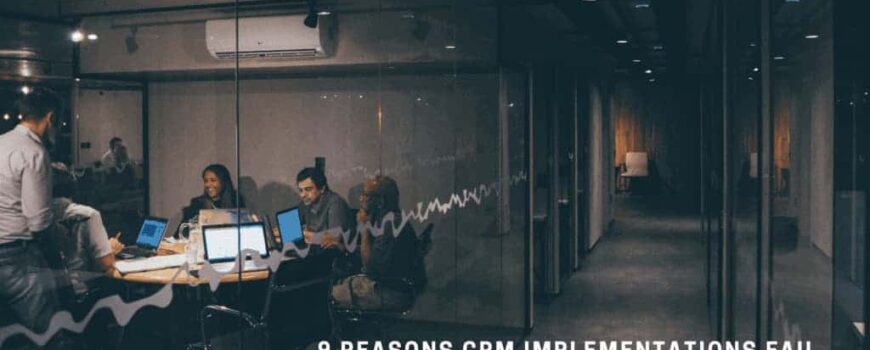CRM implementation failures can happen for many reasons. Most often CRM projects fail because the solution is ineffective and doesn’t improve your processes, the project was late, or it was over budget. Another indicator of failure is low user adoption.
If you’ve found this article, there’s a good chance you’re just starting to research Zoho CRM or Zoho One and how to implement it, or you’re down the road a bit further and you might need some help. We hope the information here about common reasons CRM projects fail and what to look out for will provide the insight you need to start off on the right foot – or even better – can help you get back on the right track with your project! Keep reading for 9 reasons CRM implementations fail, and the considerations you should address to ensure a successful Zoho CRM or Zoho One implementation.
#1) Not having a goal from the start
Every successful software implementation, especially customer relationship management software, begins with your business goals. Ask yourself:
- What are the important success indicators or KPI’s for my business and sales teams?
- How do I want my business to look in 12 to 24 months?
- …5 years from now?
Make time to invest in your vision, and document it. Your vision for success, the targets you wish to achieve, and making sure you are specific about them in planning will have great returns in your CRM implementation.
CRM Failure #2) Not customer focused

We’re talking here about the experience of your system users and external customers. A successful CRM will make the work inside your business easier and more efficient for your associates by providing a trustworthy source of truth with the data it records. And the outcome is that your external, or paying customers, gain the benefit of working with a well-organized firm that provides excellent customer service as a result of having useful insight about them. Remember to give attention to both the users and external clients who will be impacted by CRM implementation.
#3) Lack of planning
The best foundation for your CRM implementation is impeccable planning, whether that’s Zoho CRM or another product you might be researching and learning about. Your plan should include:
- Developing and understanding your goals (see CRM Failure 1).
- Selecting a team or partner to see you through the journey and beyond.
- Examining and documenting all workflows for every team using or inputting to CRM (see CRM Failure 2 & 4).
- Fully understanding and documenting your organization’s technology stack.
- Having a plan for testing, training & deployment.
- Keeping the vision for your business’ future in sight.
CRM Failure #4) No one is using the tool (i.e. Poor User Adoption)

Involve your CRM users from the start and utilize their input and experiences as a part of the overall goals to gain buy-in for a system upgrade. Learn what is important to your users and important to your business, then plan for evolution. Consider the required phases to reach your goal. Think “crawl, walk, run”, and how a multi-stage plan will help with Zoho user adoption. (Tip: Watch out for scope creep here. Bad planning also causes scope creep. Don’t look at CRM implementation as a single project, rather a tool that you want to grow and improve with your business over time.)
Understand their challenges, workflows, and how a positive outcome will impact your business (greater efficiency!). Involving your teams in this process does help with overall adoption – and bonus – you may uncover new ideas to improve workflows with CRM! For example, data around processes like sales qualification can easily be entered, tracked, and reported in a CRM. No more managing clients through email inboxes. In the right CRM, your reminders, tasks, and saved filtered views can help deliver useful information at-a-glance.
#5) No Support (Yes, this includes training!)
Starting off knowing your internal champions and whether or not you have executive support for a CRM project is paramount to its success. In your planning phase, identify internal champions keeping in mind you may have more than one depending on the complexity of your business and the teams who will use your new CRM. Additionally, executive support will be indispensable when it comes to your implementation. In our experience here at ZBrains, this high-level buy in – not only regarding budget, but for strategy and execution – can make or break an implementation.
Ensure your vendor can train your teams on Zoho and offer ongoing support, if you need it. And chances are that you really will because after the switches are flipped, your teams need to be ready to go. Vendor support is crucial when taking into consideration the plan for your CRM and your business goals. Have you selected the right software and partner? We mentioned this in planning, but it cannot be stressed enough: CRM implementation shouldn’t be considered a one-off project. Look for a partnership that aligns with and enhances your business.
CRM Failure #6) It’s the wrong software
 You find yourself thinking, “it just doesn’t do what I need it to do” and you’re putting workarounds in to practice left and right then chances are it hasn’t been built or customized to envelop your workflows. This goes back to project scope. Was an important process or workflow not considered during planning? Be sure that you are talking to your software consultant or partner about planning phases for your CRM implementation, and ensuring that each stage aligns with your business goals so you don’t end up with a software that isn’t helping you like it should. You need a software that works for your business and improves your work. Avoid applications that things down, or make straightforward tasks or reporting convoluted and difficult.
You find yourself thinking, “it just doesn’t do what I need it to do” and you’re putting workarounds in to practice left and right then chances are it hasn’t been built or customized to envelop your workflows. This goes back to project scope. Was an important process or workflow not considered during planning? Be sure that you are talking to your software consultant or partner about planning phases for your CRM implementation, and ensuring that each stage aligns with your business goals so you don’t end up with a software that isn’t helping you like it should. You need a software that works for your business and improves your work. Avoid applications that things down, or make straightforward tasks or reporting convoluted and difficult.
After you’ve implemented, you might find yourself thinking, “It’s not being widely used (by everyone) in my organization.” Be sure to check in: does everyone understand their role in using the CRM, and do they have the proper training to utilize the software in the best way possible?
#7) Your data is weird
When data is not well organized or largely incomplete, just because you put it into CRM doesn’t mean you’ll get great results. Knowing what data your business is tracking and why will help you understand the best way to organize it. Knowing what you want to get out of a CRM will absolutely impact what needs to go in, both in terms of the implementation and the data itself. CRM is often expected to be a single source of truth. This means that all of your associates must be on board with standards, governance should be deployed, and training is essential so that all of your teams have a similar sense of the data being entered, and how it is intended to be used. It’s an old adage you’ve heard before, but it’s still true: “Garbage in, garbage out.” When you have data integrity, your CRM implementation and results will shine even greater.
CRM Failure #8) Your vendor doesn’t get your goals

Have you found the right vendor for your CRM implementation? When you’re using lingo from field services and construction industries, or distribution and manufacturing, do they know what you mean? The right vendor already knows your language. They’ll use their time getting to understand your unique business needs even better. Here are some things to look for (and avoid) in a partner:
- Avoid boilerplate solutions or partners who won’t take the time to meet you and investigate your operations.
- If planning isn’t a priority for them, buyer beware. They may just wish to capitalize on scope creep. A consultant worth their weight will tell you, you can never give them too much information about your business and your goals.
- Be sure to ask your potential consultants for references from businesses in industries like yours. Contact them.
- Look for vendors who are interested in your partnership from consulting and implementation, through to future customization and optimization. Select a partner that wants to celebrate your growth and successes.
# 9) You’re trying to do it on your own
At your organization, maybe you’ve done a project like software implementation before, or maybe you haven’t, but you’re convinced to shave some expenses off the top by trying to do an implementation on your own. Be sure to ask yourself the right questions:
- Are your key stakeholders available to commit the time needed to implement a new CRM?
- Would this project take them away from their normal responsibilities and have a negative impact on your business?
- Does your team have the necessary skills to scope, plan, implement, train, and support a new CRM implementation?
- What would happen if any one of the team were to leave in the middle of the project? Could the others cover this gap in both skillset and time commitment?
- If you honestly evaluate the internal costs (expense and timeline) against the cost of hiring a consultant, are you still saving money and time?
Do your answers to any of these questions leave you feeling wary? Consider finding a partner for your project. If you’re still searching for a partner, or you want assistance with a CRM implementation that didn’t meet your expectations, drop us a line. We’d love to get to know you better. Contact us any time.


nice article, looking forward to our meeting